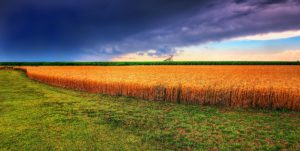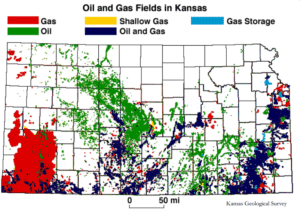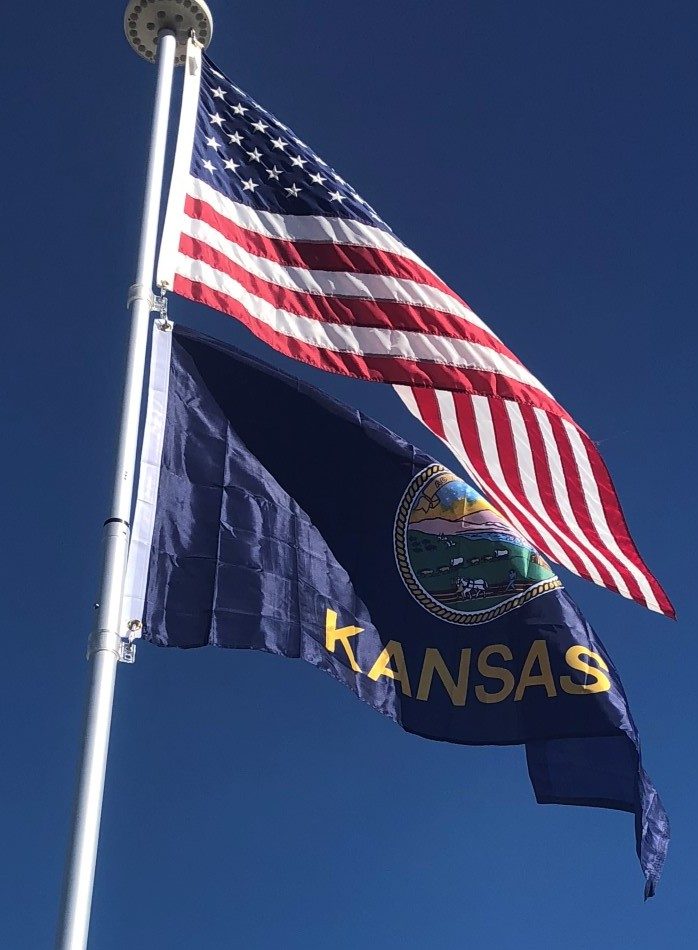
Wichita is the largest city in the state in terms of both land area and population. ‘The Air Capital’ is a major manufacturing center for the aircraft industry and the home of Wichita State University. With a number of nationally registered historic places, museums, and other entertainment destinations, it has a desire to become a cultural mecca in the Midwest. Wichita’s population growth has grown by double digits and the surrounding suburbs are among the fastest growing cities in the state.
Economy:
Nearly 90% of Kansas’ land is devoted to agriculture. The state’s agricultural outputs are cattle, sheep, wheat, sorghum, soybeans, cotton, hogs, corn, and salt. As of 2018, there were 59,600 farms in Kansas, 86 (0.14%) of which are certified organic farms. The average farm in the state is about 770 acres (more than a square mile), and in 2016, the average cost of running the farm was $300,000.
By far, the most significant agricultural crop in the state is wheat. Eastern Kansas is part of the Grain Belt, an area of major grain production in the central United States. Approximately 40% of all winter wheat grown in the US is grown in Kansas. Roughly 95% of the wheat grown in the state is hard red winter wheat.

The industrial outputs are transportation equipment, commercial and private aircraft, food processing, publishing, chemical products, machinery, apparel, petroleum, and mining.
The largest private employers in Kansas as of 2016 are:
- Spirit AeroSystems
- Sprint Corporation
- Textron Aviation
- General Motors
- Bombardier Aerospace
- Black & Veatch
- National Beef
- Tyson Foods
- Performance Contracting
Kansas is ranked eighth in US petroleum production. Production has experienced a steady, natural decline as it becomes increasingly difficult to extract oil over time. Since oil prices bottomed in 1999, oil production in Kansas has remained fairly constant, with an average monthly rate of about 2.8 million barrels in 2004. The recent higher prices have made carbon dioxide sequestration and other oil recovery techniques more economical.
Kansas is also ranked eighth in US natural gas production. Production has steadily declined since the mid-1990s with the gradual depletion of the Hugoton Natural Gas Field, the state’s largest field which extends into Oklahoma and Texas. Average monthly production was over 32 billion cubic feet.

The state’s economy is also heavily influenced by the aerospace industry. Several large aircraft corporations have manufacturing facilities in Wichita and Kansas City, including Spirit AeroSystems, Bombardier Aerospace (LearJet), and Textron Aviation (a merger of the former Cessna, Hawker, and Beechcraft brands). Boeing ended a decades-long history of manufacturing in Kansas between 2012 and 2013.
Major companies headquartered in Kansas include the Sprint Corporation (with world headquarters in Overland Park), YRC Worldwide (Overland Park), Garmin (Olathe), Payless Shoes (national headquarters and major distribution facilities in Topeka), and Koch Industries (with national headquarters in Wichita), and Coleman (headquarters in Wichita).
Transportation:
Roads:
Kansas is served by two Interstate highways with one beltway, two spur routes, and three bypasses, with over 874 miles in all. The first section of Interstate in the nation was opened on Interstate 70 (I-70) just west of Topeka on November 14, 1956.
